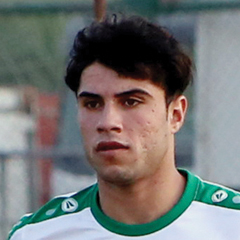
BAGHDAD: Iraqi striker Mohammed Dawood attends a training at a stadium in Baghdad on October 24, 2017. The 17-year-old football prodigy has been listed by The Guardian as one of the world's 60 most promising young players. - AFP
BAGHDAD: Mohammed Dawood, the Iraqi football prodigy, is much more just an idol in his own country. The 17-year-old is the lone Arab on a recent list of budding global talents. Just two years ago, the Baghdad-born teenager, a huge fan of Spanish football, wasn't thinking of one day rubbing shoulders with the world's elite. But his three goals-of the five scored by Iraq-at this year's Under-17 World Cup in India changed all that.
British newspaper The Guardian ranked Dawood among its top 60 aspiring young stars from around the world, with the youngster standing out as the only player from an Arab nation. That distinction makes him "very proud", Dawood, still coming to terms with his sudden celebrity status, tells AFP. "I hope to measure up to this selection," he adds, his brow concealed by thick locks of black hair.
TOP SCORER IN ASIA
In the autumn of 2016, Dawood shot to international prominence with a series of outstanding displays that fuelled Iraq's triumph at the Asian Under-16 Championship. Three of his tournament-leading six goals came in a semi-final victory over Japan, with Iraq lifting the trophy for the first time after Dawood converted the winning penalty in the shootout in the final against neighbours Iran.
"Coaches are interested in me," Dawood says of the attention his starring performances have generated. "But you don't become a star just like that. Football requires sweat and patience and success doesn't happen without working hard."
Dawood credits Qahtan al-Rubaye, the coach of Iraq's Under-17s, for his rapid rise. "It's thanks to him that I am where I am today," he tells AFP on the sidelines of a training session. In 2015, Rubaye saw Dawood play with Al-Khutoot, a second-division club in Baghdad. Shortly after that, the coach asked that the youngster to join his team. "He surprised me because the coaches in general focus on the young talents at big clubs," said Dawood.
The coach doesn't regret his decision. "I'm confident when he's on the pitch. He is gifted and he knows how to score goals," Rubaye says. "He's going to become one of the best players. I'm proud of him and for having selected him."
It's up to others now to make the same choice, says Rubaye, who is hoping his protege will be recruited by an international club where he can further his development. Last year, Dawood signed a deal for three seasons with Al-Naft of Baghdad, who finished second in the Iraqi league last term.
Hassan Ahmed, his coach at Naft, had no qualms designating the teenager a chief focal point of the team. "He is good at scoring, but he also knows how to create opportunities," he said.
SCHOOL OR SPORT?
Following his return from India, Dawood received a considerable boost to his initial $1,500 salary, enabling him to help provide for a family in which he is the youngest of six siblings.
After relying on taxi fares his elder brother earned to help make ends meet, Dawood-now earning close to $10,000 a month-can ably support those dearest to him. Money, Rubaye says, is a real concern for young Iraqi players. "The majority of them don't have any income. Several join clubs to guarantee themselves a wage while others only get their expenses paid when travelling abroad," he explains.
"I chose football and I hope I will gain what I've lost by stopping my studies," says Dawood, who still recalls the first games he played as a child at a small neighbourhood ground. Over the years football has increasingly consumed his time and energy, forcing him to choose between sport and school.
His club coach insists it is a choice which will pay off handsomely because "we have never seen a player who has already reached this level by the age of 17". "He's the future number one of football in Iraq," adds Ahmed. - AFP










